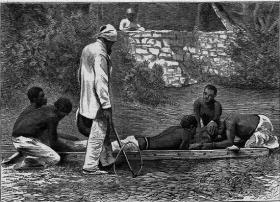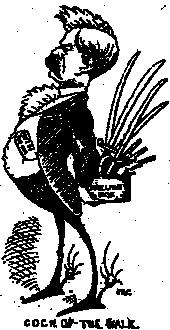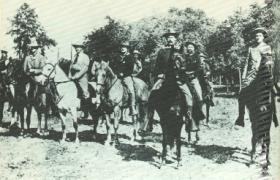‘Cuba, the Ireland of the West’: the Irish Daily Independent and Irish nationalist responses to the Spanish–American War
Published in 18th–19th - Century History, Features, Issue 4 (Jul/Aug 2008), Volume 16
A slave being punished in Spanish Cuba c. 1868. Before the American Civil War, Southern slave-holding interests supported Cuban nationalists, hoping to annex Cuba to the US as a slave state. Slavery was not formally abolished there until 1880.
During the Cuban revolt of 1895–8, culminating in the Spanish–American War, the Parnellite party and their newspaper, the Irish Daily Independent, identified wholeheartedly with the Cubans, advocated American intervention and gave sustained support to the American war effort. This derived from the personal connections of some individuals associated with the Independent (including a wealthy American interventionist), a desire to capitalise on the internal divisions of their anti-Parnellite opponents and a hope that an expansionist America might see Cuba as a precedent for intervention in Ireland.
Anglo-US tensions
The defeat of his second Home Rule Bill in 1893 led to Gladstone’s retirement; his successors in the Liberal leadership distanced themselves from Home Rule as a political liability, and the 1895 general election returned a strong Unionist majority. The Parnellite party saw this as vindicating their insistence that the anti-Parnellites could not gain Home Rule by sacrificing Parnell to the Liberal alliance; but with Home Rule apparently off the agenda, what should Irish nationalists do? One possibility, appealing to the separatist element within Parnellism, was to look for foreign intervention. In 1896 tensions between Britain and Venezuela over the British Guyana border produced an Anglo-American diplomatic crisis; President Grover Cleveland declared his intention of resisting European interference in the Americas, and briefly became a hero to Irish nationalists. The dispute was eventually settled by arbitration.
After the South American wars of independence in the 1820s, Cuba was the principal remaining Spanish colony in the western hemisphere. Its sugar industry—sustained by slave labour (slavery was not formally abolished in Cuba until 1880)—was a major source of revenue for Spanish business interests; many Spaniards emigrated to Cuba. In the period before the American Civil War, Southern slave-holding interests supported Cuban nationalists, hoping to annex Cuba to the US as a slave state. Between 1868 and 1878 Cuban rebels fought for independence in the ‘Ten Years’ War’. After its defeat, rebel leaders such as José Marti went into exile and continued to work for Cuban independence.
J. J. O’Kelly

Caricature of J. J. O’Kelly as a fighting cock from Dublin’s Warder and Weekly Evening Mail, 9 June 1883. (National Library of Ireland)
J. J. O’Kelly, a Fenian who later became Parnellite MP for Roscommon North, reported on the Ten Years’ War for the New York Herald. After crossing into rebel-held territory, he was imprisoned by the Spaniards and only released through the intervention of his newspaper and the British consul. (His account of these experiences, The Mambi-Land, is regarded as a classic; a Spanish translation is still in print in Cuba.) O’Kelly collaborated with Dion Boucicault on a play, A Free Cuban. In October 1895 the Independent reported that he was writing a play called A Cuban Rebel, presumably a reworking (both versions are lost). During the 1890s O’Kelly commented on foreign affairs in the Independent. He was personally acquainted with some of the veterans who participated in the new Cuban revolt that began in 1895, such as the guerrilla leader Antonio Maceo; after Maceo’s death in combat in December 1896 O’Kelly published a tribute to him in the Independent.
After initial rebel successes, Spanish forces implemented ruthless counter-insurgency measures under General Valeriano Weyler. Civilians were rounded up into ‘concentration camps’ (resembling the ‘strategic hamlets’ used by British forces in Malaysia and American forces in Vietnam rather than Nazi extermination camps), where many died of disease and starvation. Highly coloured reports of Spanish atrocities appeared in American newspapers; many Americans advocated intervention in Cuba from a mixture of genuine pro-Cuban sentiment and belief that America should assert herself as equal to other imperial powers.
On 7 January 1896 an Independent editorial welcomed Cuban rebel successes; on 13 April it called on the Irish people to support the Cuban rebels. On 1 October the paper expressly called for American intervention to bring about Cuban independence. The Independent later denounced Cleveland for refusing to recognise the Cuban insurgents as belligerents. While lamenting ‘the ruination of Cuba’, it noted that the war brought Spanish finances to breaking point. On 22 June 1897 it welcomed President William McKinley’s decision to formally support Cuban autonomy.
Louis Stuyvesant Chanler
Developments in 1897 reinforced the Independent’s pro-Cuban position. The Independent papers were chronically undercapitalised. In 1897 the company was remodelled. The founding editor, Edward Byrne, was replaced, many staff were fired, and a new board member appeared—Louis Stuyvesant Chanler, a relative of the wealthy Astor family living in England with the intention of eventually returning to New York. His support for Parnellism reflected an interest in New York Democratic politics. (Redmond offered Chanler a parliamentary seat, which he declined, as it would have meant surrendering his American citizenship.) In later life he was successively lieutenant governor of New York and a prominent Baha’i. His millionaire brother, William Astor Chanler, engaged in gun-running to Cuban insurgents. In the Spanish–American war William Astor Chanler fitted out a warship at his own expense; the Independent published glowing reports of his Cuban exploits.
In January 1898 Spain offered Cuba an autonomous government subject to Spanish sovereignty; the Independent was sceptical. J. J. O’Kelly highlighted reports that Spanish loyalists in Cuba (plantation-owners and recent immigrants from Spain, organised into paramilitary forces) threatened resistance. When the rebels rejected the proposal, the Independent congratulated them on not being misled by ‘sham Home Rule’.
‘Just and holy crusade’
In response to political pressure, the McKinley administration sent the battleship Maine to Havana. On 15 February the Maine was destroyed by an explosion (possibly accidental but widely blamed on the Spaniards). The Independent welcomed the subsequent American war fever. When the anti-Parnellite Freeman’s Journal protested that the Independent ignored Pope Leo XIII’s peace efforts, the Independent retorted that there could be no just peace until Spain was cleared from Cuba. On 21 April, announcing the American declaration of war, the Independent proclaimed that America was waging a ‘just and holy crusade’. Once hostilities began, the paper joined speculation about the whereabouts of Spain’s Atlantic fleet under Admiral Cervera (which made its way to Santiago de Cuba to support the garrison against the impending American attack).

The wealthy American explorer and adventurer William Astor Chanler (clean-shaven, on horse at far right) leading a group of American irregulars on their way to fight in Cuba. Chanler’s brother Lewis was active in Parnellite politics and a significant backer of the Irish Daily Independent.
On 1 April the Independent reported a pro-American resolution by the Parnellite parliamentary party, followed by a meeting of the Irish Independent League, the Parnellite grass-roots organisation. The Parnellite MPs sent congratulations to America on news of Admiral Dewey’s destruction of a Spanish fleet at Manila. The war forced the cancellation of a ‘national pilgrimage’ by Irish-Americans to the 1798 centenary celebrations; the Independent told Irish commemorationists that their American friends marked the occasion appropriately by fighting for Cuba, ‘the Ireland of the West’.
Pro-Spanish statements by the Freeman and its stable-mate the Evening Telegraph (which the Independent called ‘the organ of Spain published in Princes’ Street’) provided the Parnellites with political ammunition. Their motive appears to have been sympathy for Spain as a Catholic country (accompanied by romanticised memories of Spanish hospitality to the Irish Wild Geese of the seventeenth century), but the anti-Parnellite leader John Dillon and prominent figures such as Michael Davitt were firmly pro-American. The Independent juxtaposed the Freeman’s comments with accounts of Spanish atrocities against Cubans. Photographs of starving Cubans in Spanish concentration camps were displayed in the windows of the Independent office on Trinity Street. The paper’s American correspondent, John O’Callaghan, reported that the Freeman’s views infuriated Irish-Americans, while the nativist American Protective Association cited the Freeman as proof of Catholic anti-Americanism.
‘Don’ McAleese
The most outspoken pro-Spanish MP was Daniel McAleese, a Healyite who represented North Monaghan. The Independent claimed that McAleese was called ‘Don’ McAleese by colleagues because of his Hispanophilia. It enquired whether priests who supported Spain would sell tickets for their fund-raising bazaar in Spain rather than America.
As American forces besieged Santiago de Cuba in early June, O’Kelly described his imprisonment and drew on his memories of the terrain to explain the military situation. On 4 July, as the Independent reported fighting around Santiago and the capture of San Juan Hill by Theodore Roosevelt’s Rough Riders, it openly wished that America would intervene in Ireland as in Cuba. The next day it described the attempted breakout of Admiral Cervera’s fleet, resulting in near-total destruction of the Spanish ships with almost no American casualties. (This was followed by the surrender of Santiago and virtual cessation of hostilities.)
One unwelcome possibility that the Independent glanced at (a possible source of pro-Spanish sentiment) was that an expansionist America might ally with Britain against rival powers. It regularly voiced suspicions that Britain was trying to draw out the war, claiming that the only American supporters of a British alliance were ‘Jews and New England mugwumps’; Louis Chanler declared settlement of Ireland’s claims an indispensable precondition of any Anglo-American alliance. The post-war revolt against American occupation of the Philippines by Filipino nationalists who expected independence and got an American protectorate was similarly attributed to British intrigue.
Despite post-war revelations of bungling by American military authorities and growing tensions between Cubans and Americans (prefiguring subsequent Cuban experience as a nominally independent American satellite), the Independent declared that Spanish cession of Cuba ‘opens a new chapter in history’. A sceptical Dublin Parnellite councillor, Joseph Hutchinson, criticised the Independent for lavishing attention on a conflict irrelevant to Ireland; he stated that if Cuba had been a British colony America would not have intervened. At the same time, Parnellite sympathy with the Cubans should not be attributed entirely to political expediency; it reflects the long-running tension between versions of Irish nationalist identity that emphasised Catholicism and those that highlighted solidarity with other oppressed nations.
Patrick Maume is an editorial assistant with the Royal Irish Academy’s Dictionary of Irish Biography.
Further reading:
R. Dye, ‘Irish-American ambivalence towards the Spanish–American War’, New Hibernia Review 11 (3) (Autumn 2007), 98–113.
J. J. O’Kelly, The Mambi-Land; or adventures of a Herald correspondent in Cuba (1874; reprints available online from Kessinger Publishers and University of Michigan Library).
H. Thomas, Cuba: the pursuit of freedom (London, 1971; revised and abridged edition, 2001).
L. Thomas, A pride of lions: the Astor orphans (New York, 1971).
















